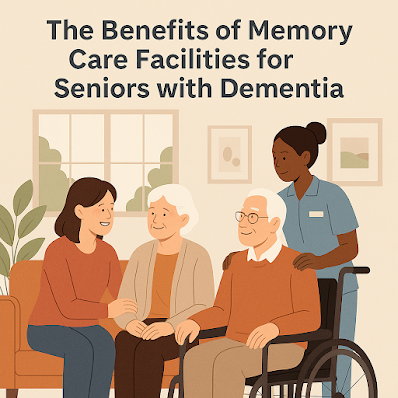The Benefits of Memory Care Facilities for Seniors with Dementia
When a loved one is diagnosed with dementia, it can be an overwhelming and emotional journey for families. As the condition progresses, specialized care becomes crucial to ensure your loved one’s safety, comfort, and quality of life. Memory care facilities are designed specifically to meet the needs of seniors living with dementia, Alzheimer’s disease, and other memory-related conditions.
In this post, we’ll walk you through the key benefits of memory care facilities and why they are often the best choice for seniors with cognitive challenges.
What Is a Memory Care Facility?
Memory care facilities are specialized senior living communities that provide structured environments, expert care, and supportive services tailored for individuals with memory impairments. These facilities focus on creating a safe, nurturing, and engaging atmosphere to help residents live as independently and joyfully as possible.
1. Specialized Dementia Care
One of the most important benefits of memory care facilities is the expertise of the staff. Caregivers and healthcare professionals receive specialized training in dementia care, including:
-
Managing challenging behaviors such as aggression, wandering, and confusion.
-
Communicating effectively with residents experiencing cognitive decline.
-
Providing compassionate and patient-centered support.
This specialized training ensures that your loved one’s unique needs are recognized, understood, and addressed in the best way possible.
2. Safe and Secure Environment
Seniors with dementia are at higher risk of accidents, wandering, and getting lost. Memory care facilities are designed with safety in mind:
-
Secured entrances and exits to prevent wandering.
-
24/7 supervision by trained staff.
-
Emergency response systems throughout the facility.
-
Easy-to-navigate layouts to reduce confusion and anxiety.
This environment gives families peace of mind, knowing their loved ones are in a secure and supportive setting.
3. Personalized Care Plans
Every resident has different needs and challenges, especially when dealing with dementia. Memory care communities create individualized care plans based on:
-
Cognitive abilities
-
Physical health
-
Personal preferences and routines
As your loved one’s condition changes, the care plan adapts — ensuring they always receive the appropriate level of support.
4. Daily Activities and Cognitive Stimulation
Staying mentally and physically active is crucial for seniors with dementia. Memory care facilities offer structured activities designed to:
-
Boost memory and cognitive function
-
Reduce feelings of isolation or depression
-
Encourage physical exercise and motor skills
Popular activities may include music therapy, arts and crafts, fitness classes, reminiscence sessions, and sensory stimulation exercises. These activities not only keep residents engaged but also provide a sense of purpose and joy.
5. Focus on Emotional and Social Well-Being
Dementia can cause feelings of confusion, frustration, and loneliness. Memory care communities create a social environment where residents can connect with others facing similar challenges. Facilities often provide:
-
Group dining experiences
-
Social clubs and support groups
-
Scheduled events and celebrations
Social interaction promotes emotional well-being and helps prevent feelings of isolation, improving the overall quality of life for residents.
6. Support for Families
Caring for a loved one with dementia can be physically and emotionally draining. Memory care facilities offer valuable support for families, including:
-
Regular updates and communication
-
Family support groups
-
Counseling services
-
Education about dementia and caregiving techniques
This support system helps families stay connected, involved, and informed without bearing the full burden of daily caregiving.
7. Access to Medical and Health Services
Memory care residents often have access to on-site medical services, which may include:
-
Medication management
-
Regular health assessments
-
Physical therapy, occupational therapy, and speech therapy
-
Coordination with physicians and specialists
Having medical care readily available ensures that health changes are addressed quickly and appropriately.
8. Improved Quality of Life
At its heart, memory care is about giving seniors the best quality of life possible. By providing a safe environment, personalized support, engaging activities, and compassionate care, memory care facilities help residents maintain dignity, independence, and happiness for as long as possible.
Families can rest easier knowing their loved one is in a place designed to meet their evolving needs with expertise and compassion.
Is Memory Care the Right Choice for Your Loved One?
If your loved one is showing signs of dementia or Alzheimer’s and needs more support than can be provided at home, it may be time to explore memory care options. A high-quality memory care facility can provide the specialized care, safety, and enrichment that your loved one deserves — while offering much-needed relief and peace of mind for you and your family.
Need Help Finding the Right Memory Care Facility?
At Bay Area Senior Care Placement, we specialize in helping families find the best memory care communities tailored to their loved one’s needs, preferences, and budget.
Our services are completely free to families — we are compensated directly by the facilities — so you can receive expert guidance without any additional cost.
We’re here to guide you through every step of the process and make finding the right care less overwhelming.
📞 Contact us today or visit www.bayareaseniorcareplacement.com to get started.
Your loved one deserves the best care, and we’re here to help you find it.



Comments
Post a Comment